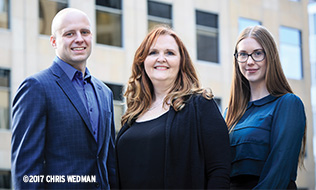
Chartered professional accountant Chris Coben wanted to work internationally so he could experience how a different country approaches the type of work he does. At the same time, he was looking for an opportunity to travel.
That’s why Coben, an audit manager at Collins Barrow Calgary LLP, headed to Britain on an international secondment program offered through the firm’s affiliation with Baker Tilly International Ltd. The program provides employees with designated opportunities to work overseas on a temporary work term.
Read: 39% of employees would take pay cut for better career development: survey
“It broadened my horizons,” says Coben, 29, who worked as an audit supervisor at accounting firm MacIntyre Hudson LLP from September to December 2015. “It’s impacted the way I approach files at Collins Barrow.”
Sharing best practices
“We are getting exceptionally good young professionals on both ends,” says Liz Benoit, Collins Barrow Calgary’s human resources director. “The benefits are the sharing of best practices and the opportunities that arise from building those relationships. Secondees learn leadership skills because, as senior accountants, they will often be leading an audit or other projects, and they get to experience two busy seasons. Plus, it looks great on their resume to have international experience.”
From a business standpoint, the international secondment program helps both Collins Barrow Calgary and the other firm, she adds. “We have extra people during our busy season and fewer people on our payroll during our non-busy season. . . . It’s very easy for us to attract talent from other countries because of the mountains. They want to come because of the lifestyle and the experience.”
Read: How to support Generation Z employees
Collins Barrow Calgary is currently hosting audit senior Genevieve Bluett, 25, who hails from Melbourne, Australia, where she works at Pitcher Partners, a large accounting firm.
“I always wanted to come to Canada or America, and I chose Calgary because it’s so different. We don’t get any snow at home, except in the mountains,” says Bluett.
A lure for younger employees
Depending on the industry, international secondment programs are fairly common but they’re becoming more so as time goes on, according to Jeni Whiting, a strategic human resources consultant based in Calgary.
“I think it’s critical for an international business that has global clients,” she says.
“It’s an exceptional opportunity for employees and for the business,” she adds. “A young professional getting some exposure to how business works in other parts of the world is so valuable. And from a business perspective, what you get is a well-rounded employee.”
Read: Employee engagement in Canada rises to 70%: survey
There’s a lot of planning that needs to go into the programs, Whiting adds. Business leaders, she says, need to consider questions such as: Who are the mentors going to be? What will the outcomes be and how will the organization bring that learning back?
Richard Bucher, vice-president of career management at Right Management Inc., sees these types of programs as a perk for organizations that are looking to attract and retain top talent, particularly younger employees.
“This is something they would find very appealing,” he says.
Read: Cisco workers get five days to give back under formalized volunteer policy
What’s essential, according to Bucher, is that when employees have gone overseas on a secondment, the experience shouldn’t end when they come back.
“They need to be thinking about how to nurture and maintain those relationships they’ve made to benefit the broader organization,” he says.
“And if you can tie that experience to your revenue line, then all the better.”
Jacqueline Louie is a freelance writer based in Calgary.
Get a PDF of this article.
